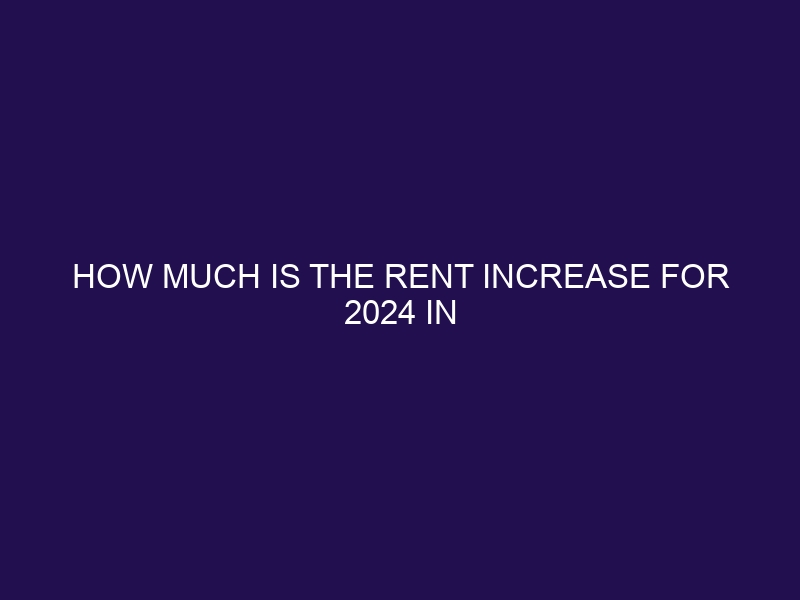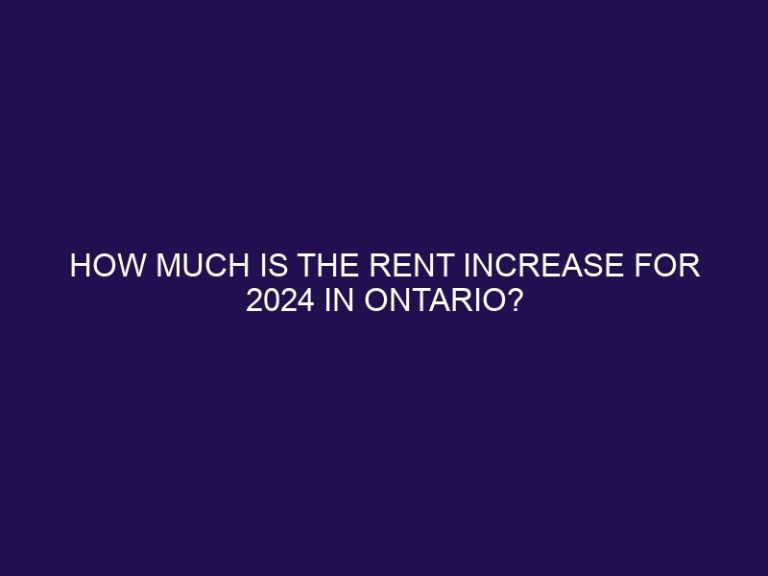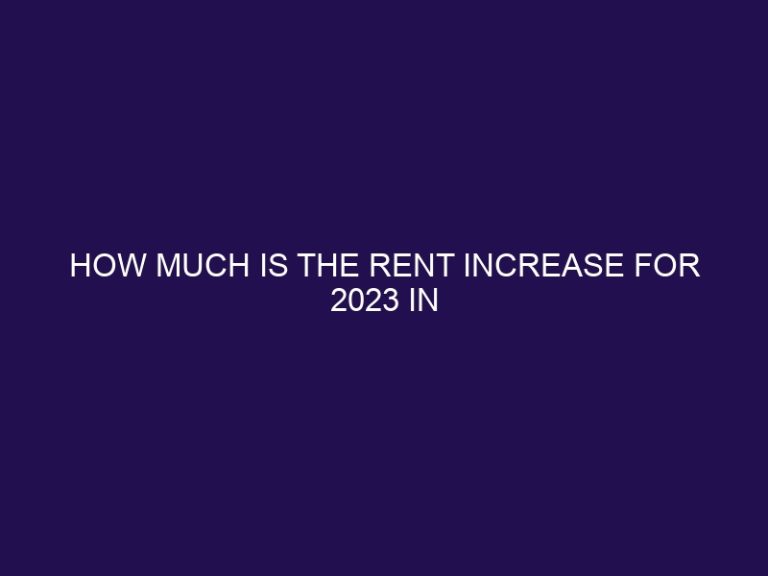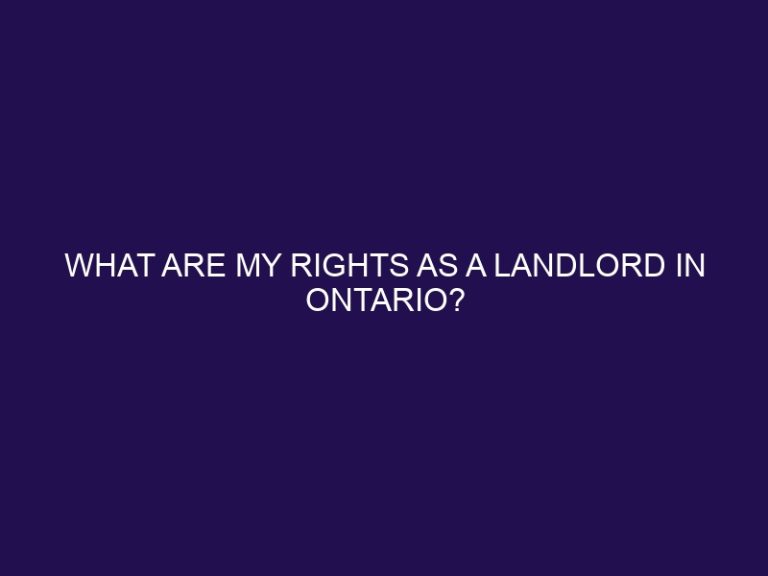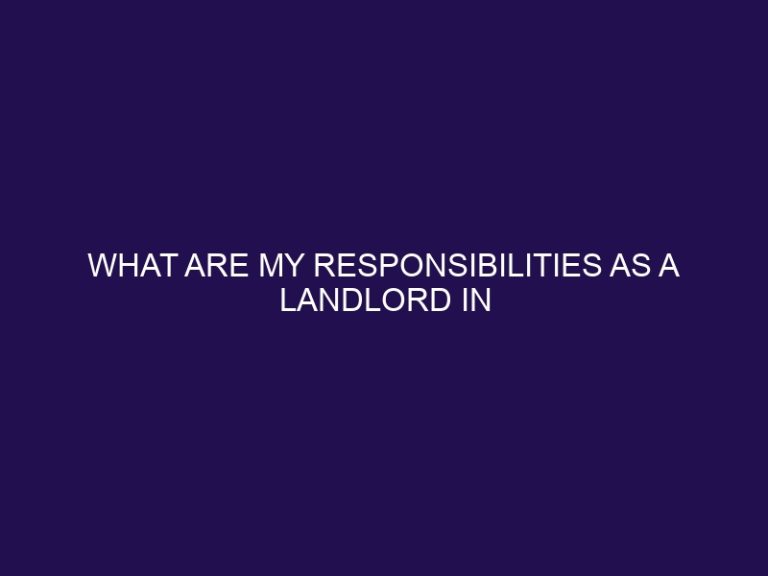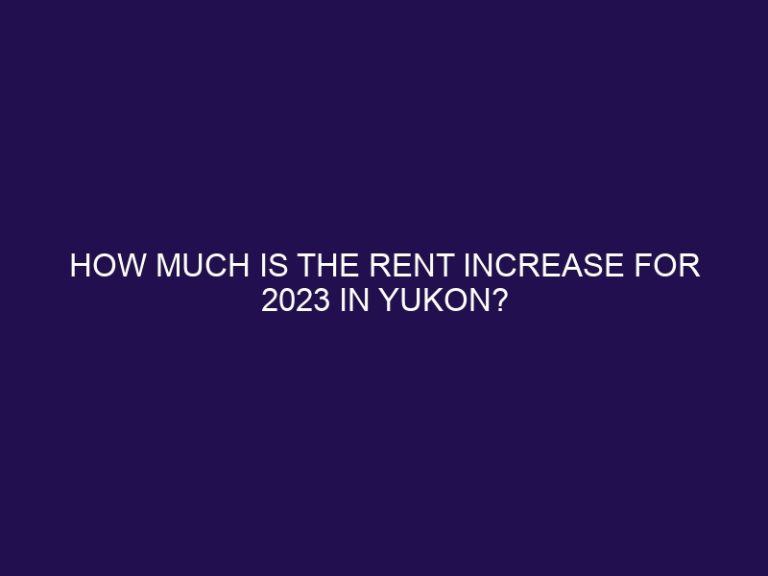How much is the rent increase for 2024 in Manitoba?
.jpg)
Rent increase is a topic of concern for many renters in Manitoba. Understanding the rent increase guidelines and regulations is crucial for tenants to plan their finances accordingly. The guidelines determine the maximum allowable rent increase for a given year. The rent increase guideline for 2024 in Manitoba will have a significant impact on tenants’ housing costs.
The rent increase guideline is determined by considering various factors, such as the inflation rate and the operating costs for landlords. These factors play a crucial role in determining the maximum rent increase that landlords can implement.
For renters in Manitoba, it is important to understand the specifics of the rent increase for 2024. Knowing the maximum allowable rent increase will help tenants to anticipate and budget for any potential changes in their monthly housing expenses.
Factors that impact rent increases include the inflation rate, which affects the cost of living and the expenses incurred by landlords. operating costs for landlords, such as property maintenance and improvements, can also influence the rent increase.
For renters, it is advisable to plan for the potential rent increase by reviewing their budget and ensuring they can accommodate any changes in housing costs. Furthermore, seeking rental assistance programs, if available, can provide financial relief for those facing difficulties due to rent increases.
If a tenant disagrees with the proposed rent increase, they have certain rights and options. It is essential to understand the proper steps to take and the resources available to address any disagreements or concerns regarding rent increases.
By understanding the rent increase guidelines, considering the factors that impact rent increases, and knowing their rights as tenants, individuals can navigate the rental market in Manitoba more confidently and make informed decisions regarding their housing expenses.
Key takeaways:
- The Rent Increase Guideline determines the maximum percentage by which landlords can increase rent in Manitoba for 2024.
- The Rent Increase Guideline for 2024 is determined based on factors such as the inflation rate and operating costs for landlords.
- Renters should plan for the rent increase by considering their budget and exploring rental assistance programs if needed.
What is the Rent Increase Guideline?
What is the Rent Increase Guideline?
The rent increase guideline is a government regulation that sets the maximum percentage by which landlords can increase rents in a given year. This guideline ensures stability for tenants, preventing excessive and unfair rent hikes. By taking into account factors such as inflation and economic conditions, the rent increase guideline guarantees that any rent increases remain reasonable and affordable. For instance, let’s consider Manitoba in 2024, where the rent increase guideline is set at 1.6%. This means that landlords in Manitoba cannot increase rents by more than this specific percentage. Understanding the rent increase guideline is crucial for both landlords and tenants to navigate the rental market fairly and transparently.
How is the Rent Increase Guideline Determined?
The Rent Increase Guideline in Manitoba is determined by considering various factors. To understand how the Rent Increase Guideline is determined, it is important to take into account the inflation rate, which is the rate at which prices for goods and services rise. Additionally, the operating costs for landlords, including maintenance and utilities, are also considered. The Residential Tenancies Branch of Manitoba takes all these factors into consideration when calculating the Rent Increase Guideline. This knowledge can help renters anticipate and plan for potential rent increases. To stay informed, renters can refer to resources provided by the Residential Tenancies Branch or seek advice from tenant advocacy groups.
Understanding Rent Increase for 2024 in Manitoba
Understanding Rent Increase for 2024 in Manitoba
Rent increase for 2024 in Manitoba is governed by specific rules and regulations. Landlords can only increase the rent once a year and must provide proper notice to tenants. The maximum allowable rent increase for 2024 in Manitoba is set at 1.6%, which is based on the provincial rent guideline. This means that landlords cannot increase the rent by more than this percentage. It is important for tenants to be aware of their rights and responsibilities and understand the rent increase process to ensure a fair and legal rental experience.
Pro-tip: Tenants should always review their lease agreement and consult with their local rental housing authority for any specific guidelines or rules regarding rent increases in their area.
What is the Maximum Rent Increase for 2024?
Looking into the Maximum Rent Increase for 2024, we’ll dive into two critical factors: the Inflation Rate and the Operating Costs for Landlords. This gives us a comprehensive understanding of the financial dynamics that contribute to shaping the rent increase for the year. So, let’s uncover the facts and figures behind the scenes, revealing the impact these elements have on the rental market in Manitoba.
Inflation Rate
The inflation rate plays a significant role in determining rent increases in Manitoba. It is important for both landlords and renters to understand how this rate impacts rental prices. Here is an example of a table illustrating the relationship between the inflation rate and rent increases:
| Inflation Rate | Rent Increase |
|---|---|
| 0-1% | 1-2% |
| 1-2% | 2-3% |
| 2-3% | 3-4% |
| Above 3% | Negotiable |
As the inflation rate increases, landlords may be able to justify higher rent increases to cover their operating costs. Renters should be aware of their rights and seek proper assistance if they believe the rent increase is unfair or unreasonable.
Operating Costs for Landlords
- Operating costs for landlords play a crucial role in determining rent increases in Manitoba. Here are some key factors to consider:
- Maintenance and repairs: Landlords often need to cover expenses for routine maintenance and unforeseen repairs, which contribute to the overall operating costs.
- Property taxes: Landlords are responsible for paying property taxes, which can increase over time and add to their operating costs.
- Insurance: Landlords must have insurance coverage for the rental property, and this is an additional cost that contributes to the overall operating costs.
- Utilities: Landlords may cover certain utilities like water or trash collection, which further adds to the operating costs they have to bear.
- Management fees: If landlords hire a property management company, their fees become part of the operating costs and must be taken into consideration when determining rent increases.
To cope with these expenses, landlords may consider evaluating their rental income and adjusting rent accordingly. They can also explore strategies to reduce costs or improve efficiency. Finding affordable suppliers or implementing energy-saving measures are examples of steps landlords can take to minimize their operating costs.
Considerations for Renters
Renters in Manitoba, listen up! As we brace ourselves for the upcoming year, it’s crucial to be aware of the considerations that lie ahead. In this section, we’ll dive into the important factors renters must keep in mind. From planning for the rent increase to exploring rental assistance programs, we’ve got you covered. So, buckle up and let’s navigate the ever-evolving landscape of renting in Manitoba like seasoned experts.
Planning for the Rent Increase
Planning for a rent increase can help you financially prepare and reduce stress. Here are some steps to consider:
- Evaluate your budget: Assess your current expenses and income to determine how much you can afford to allocate for the rent increase.
- Start saving early: Set aside a portion of your income each month specifically for the rent increase. This will help you build up a buffer to handle the higher rent.
- Review your lease: Familiarize yourself with the terms of your lease, including any clauses regarding rent increases. Understand your rights and responsibilities as a tenant.
- Explore rental assistance programs: Research and see if there are any government or nonprofit programs available to help you with the increased rent.
- Communicate with your landlord: If you anticipate difficulty in paying the higher rent, discuss your situation with your landlord. They may be willing to negotiate or offer a payment plan.
Seeking Rental Assistance Programs
“`
- Seeking rental assistance programs: Look for rental assistance programs in your area, such as government-funded initiatives or non-profit organizations.
- Eligibility criteria: Check if you meet the requirements for each program, which may include income limits, household size, and specific circumstances.
- Application process: Follow the application guidelines provided by the rental assistance programs, which may include submitting documents such as proof of income or lease agreements.
- Follow-up: Stay in contact with the rental assistance programs to ensure your application is progressing and to provide any additional information if needed.
- Other resources: Explore additional resources that may be available, such as local community centers or housing advocacy groups that offer support or advice in navigating the rental process.
Remember to start the process early and be proactive in seeking rental assistance programs to ensure a smoother experience.
What to Do if You Disagree with the Rent Increase?
If you disagree with a rent increase in Manitoba, there are steps you can take to address the issue. First, carefully review your tenancy agreement and understand your rights as a tenant. You may want to seek legal advice to determine if the increase is lawful. Communicate your concerns with your landlord and try to negotiate a fair resolution. If this fails, you can file an application with the Residential Tenancies Branch to dispute the increase. Remember to document all correspondence and actions taken. Understanding your rights and taking appropriate action can help you navigate rent increase disputes effectively.
What to Do if You Disagree with the Rent Increase? In 1971, tenants in Manitoba faced significantly high rent increases, leading to widespread protests and demonstrations. Organized tenant associations and advocacy groups played a crucial role in raising awareness about the issue and fighting for fair and affordable housing. As a result of these efforts, the government introduced rent control measures and implemented regulations to limit unjustifiable rent increases. This historic struggle highlights the importance of tenant solidarity and active engagement in advocating for affordable housing.
Some Facts About How Much is the Rent Increase for 2024 in Manitoba:
- ✅ The rent increase guideline for 2024 in Manitoba is set at three percent. (Source: Residential Tenancies Branch)
- ✅ Landlords must provide tenants with written notice at least three months in advance of a rent increase. (Source: Residential Tenancies Branch)
- ✅ Rents in Manitoba can generally only be increased once a year. (Source: Residential Tenancies Branch)
- ✅ Certain types of rental units are exempt from following the annual rent increase guideline. (Source: Residential Tenancies Branch)
- ✅ Landlords have the option to apply for a larger rent increase if they can demonstrate that the guideline amount will not cover their incurred cost increases. (Source: Residential Tenancies Branch)
Frequently Asked Questions
What is the rent increase guideline for 2024 in Manitoba?
The rent increase guideline for 2024 in Manitoba is three percent, effective January 1, 2024. This information is provided by the Residential Tenancies Branch.
Which sections of the Residential Tenancies Act address rent increases?
Sections 25 to 28 of the Residential Tenancies Act address rent increases. These sections state that landlords must give tenants three months’ notice before increasing the rent.
Can landlords increase the rent more than the guideline amount?
Yes, landlords have the option to apply for a larger rent increase if they can demonstrate that the guideline amount will not cover their incurred cost increases. They must provide proper written notice to the tenants.
Are there any exemptions to following the annual rent increase guideline?
Yes, certain units are exempt from following the annual rent increase guideline. These include units renting for $1,615.00 or more per month, various types of social housing, rental units owned and operated by government entities, rental units in buildings first occupied after March 2005, not-for-profit life lease units, cooperative units, and approved rehabilitated rental units.
Where can I find more information about rent increases in Manitoba?
You can find more information about rent increases in Manitoba on the Residential Tenancies Branch website. They provide fact sheets and frequently asked questions (FAQs) for both landlords and tenants regarding rent increases.
How is the rent increase guideline for 2024 calculated?
The rent increase guideline for 2024 is determined using a transparent method outlined in the Residential Rent Regulation. It is based on the percentage change in the average annual “All-Items” Consumer Price Index (Manitoba only) data published by Statistics Canada. For a detailed explanation of how the guideline is calculated, refer to the provided link.

